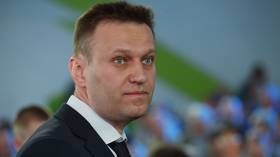‘State terrorism’: Russian opposition figure Navalny names men he believes 'poisoned him' & accuses Kremlin of ordering hit

Russian opposition figure Alexey Navalny has named eight men he believes are responsible for poisoning him last August. They are allegedly employees of the FSB security service who appear to have chemical or medical backgrounds.
“I know who wanted to kill me. I know where they live. I know where they work,” Navalny wrote on Monday. “I know their real names. I know their fake names. I have photos of them.”
According to Navalny, using his personal blog, of the eight suspected plotters, three – named as Alexey Alexandrov, Ivan Osipov, and Vladimir Panyaev – followed him to Tomsk, where he was allegedly poisoned with the normally deadly nerve agent Novichok.
Also on rt.com Captain Underpants? Sunday Times claim Navalny was poisoned twice sees bottom fall out of Western narrative on opposition figureThe investigation, conducted by Russian-language outlet The Insider, along with CNN, Germany’s Der Spiegel, and the US-state funded Bellingcat, concluded that the FSB began monitoring Navalny in 2017, after he announced his intention to run for the Russian presidency. Using telephone records, flight tickets, and other data Bellingcat claims was purchased on the black market, they came to the conclusion that highly specialized operatives trailed Navalny during at least 37 different trips. It is alleged the operation eventually ended with Navalny being poisoned on August 20 in Tomsk.
The investigative team also claims that Navalny was followed on a trip to Kaliningrad in July, when his wife Yulia fell ill – which the activist now suspects was due to Novichok, regarded as the most lethal nerve agent in the world.
As well as naming the specific individuals he believes were involved, Navalny also writes in detail about some of the trips he believes he was trailed on. For example, travel records published on Monday claim that, in March 2017, he was followed to four different cities in four days by two FSB officers – Alexey Krivoshchekov and Alexey Aleksandrov.
In conclusion, Navalny wrote that it is “an irrefutable fact” that his alleged poisoning was “a government operation.”
Also on rt.com This is ‘bulls**t’: Kremlin uses English expletive to lash Sunday Times article accusing Russian state of poisoning Navalny twice“An entire department of the FSB, under the leadership of high-ranking officials, has been conducting an operation for two years, during which time they tried on several occasions to kill me and my family members by obtaining chemical weapons from a secret state laboratory,” he wrote.
More directly, Navalny specifically named Russian President Vladimir Putin as being the one to order his poisoning, theorizing that the head of the FSB, Alexander Bortnikov, would not go ahead with such an act without his boss’ approval.
“Look in the dictionary and read the definition of ‘state terrorism.’ This is it. Illegal murder of citizens without trial or investigation,” he wrote.
“This assassination attempt has been solved. And now you understand for sure that it will not be officially disclosed. Otherwise, half of the FSB leadership will have to be jailed. And Putin, who gave them the order.”
Also on rt.com Russian doctor who treated Navalny accuses Sunday Times of pushing ‘fake news’ over claims hospital enabled activist’s poisoningThe Kremlin has repeatedly denied any role in the alleged attack, with Putin himself saying he personally asked Russian prosecutors to allow Navalny to travel to Germany for medical treatment in August.
On August 20, Navalny fell ill on a flight to Moscow from the Siberian city of Tomsk. The plane was forced to emergency land in Omsk, another Russian city, where he was taken to the hospital and placed in a coma. After requests from his family and associates, he was flown to Berlin’s Charité Clinic for treatment. Shortly after arriving in Germany, doctors announced that the opposition figure had been poisoned with Novichok. Russian doctors continue to deny that any poisoning took place. On September 23, Navalny was discharged.
Think your friends would be interested? Share this story!















